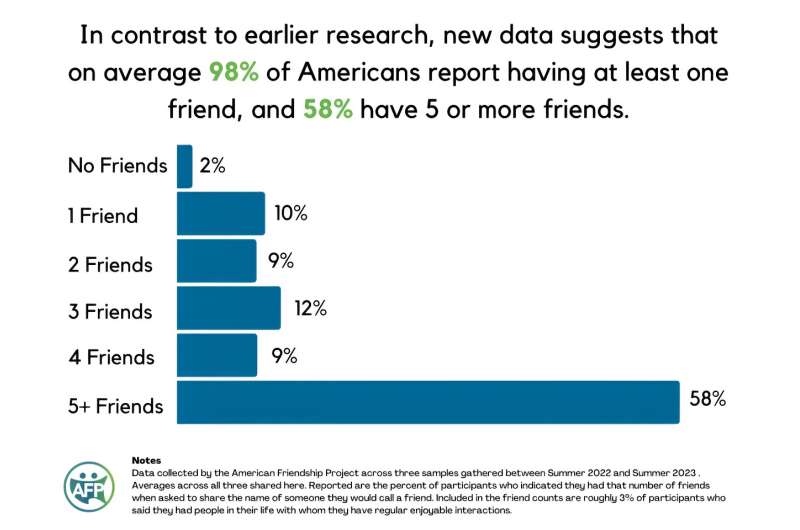This article has been reviewed according to Science X's editorial process and policies. Editors have highlighted the following attributes while ensuring the content's credibility:
fact-checked
peer-reviewed publication
trusted source
proofread
Study finds friendships in America may be in less peril than previously thought

American adults may typically have more friends than indicated by other recent surveys, with fewer Americans having no friends at all—though many would like closer friendships. Natalie Pennington of Colorado State University, US, and colleagues present these preliminary findings from the ongoing "American Friendship Project" in a study published July 30, 2024, in the open-access journal PLOS ONE.
Having more and higher quality friendships is linked with greater happiness and life satisfaction. However, research suggests that more and more American adults are facing loneliness and spending less time being social. Nonetheless, evidence conflicts as to whether the number and quality of friendships among Americans are actually in decline.
To get a clearer picture of American friendship, Pennington and colleagues launched the American Friendship Project, an ongoing, multi-year survey study. In 2022 and 2023, they gathered baseline data by surveying nearly 6,000 American adults about their friendships and well-being.
This initial data suggests that an American adult has an average of four or five friends, similar to numbers reported in previous research from 1970 to 2015. Approximately 2% of participants reported being friendless, which is also in line with data from prior decades.
These findings suggest that recent concerns about increasing friendlessness may be inaccurate. However, while participants generally reported satisfaction with their friendships, many indicated a desire for more time spent with their friends or for higher quality friendships.
The analysis also suggests that participants often talk with friends in person, though phone calls and texting are also common. A subset of participants who were college students were more likely to report meeting new friends at school and tended to maintain friendships for briefer time periods than a general adult subset of participants.
While analyzing the baseline data, the researchers also evaluated the methodology and limitations of the American Friendship Project, considering such questions as people's varying definitions of "friend" and whether friendships reported in surveys may be reciprocated or not by the other parties.
Overall, the researchers say the project shows promise for shedding new light on friendship and well-being over time, which could inform efforts to increase and improve such relationships.
The authors add, "Americans long for greater closeness with friends; although over 75% were satisfied with the number of friends they had, 42% felt they were not as close to their friends as they would like."
More information: The American Friendship Project: A report on the status and health of friendship in America, PLoS ONE (2024). DOI: 10.1371/journal.pone.0305834
Journal information: PLoS ONE
Provided by Public Library of Science





















